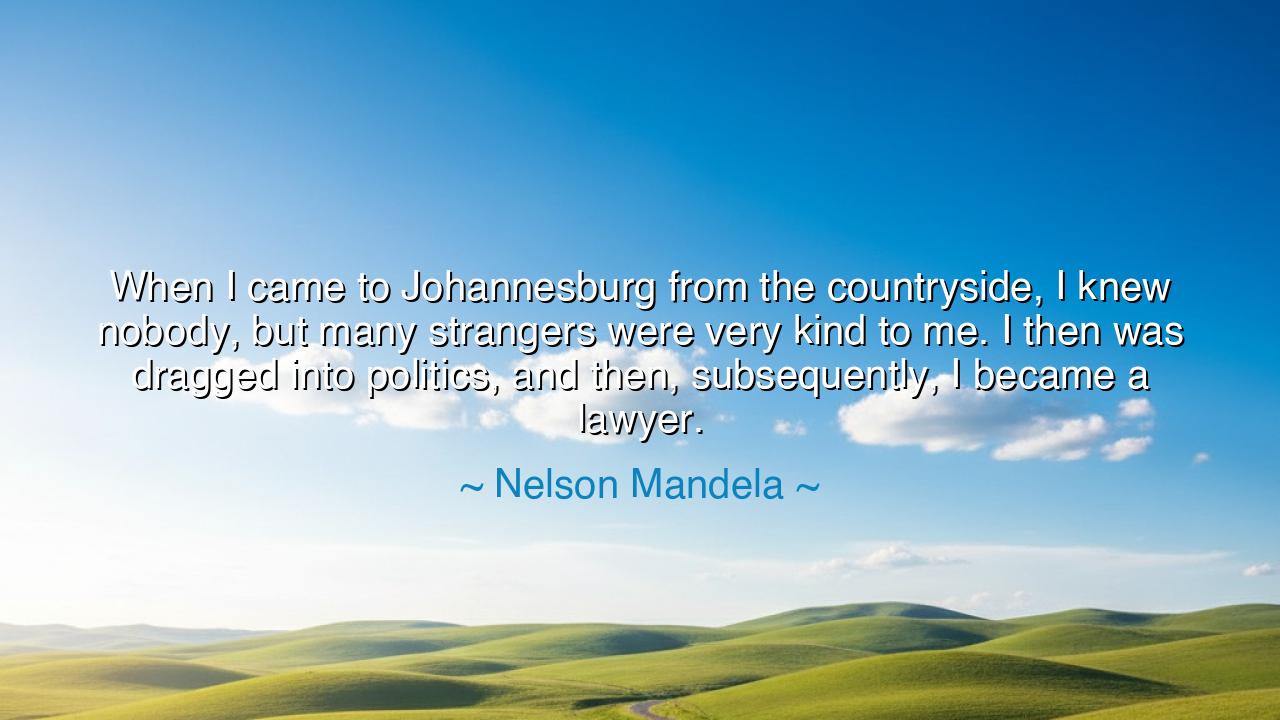
When I came to Johannesburg from the countryside, I knew nobody
When I came to Johannesburg from the countryside, I knew nobody, but many strangers were very kind to me. I then was dragged into politics, and then, subsequently, I became a lawyer.






The words of Nelson Mandela — “When I came to Johannesburg from the countryside, I knew nobody, but many strangers were very kind to me. I then was dragged into politics, and then, subsequently, I became a lawyer.” — shine as a testament to the mystery of destiny. He speaks humbly of his journey, not as a plan carefully laid, but as a path shaped by the kindness of others and the pull of circumstance. From the countryside he came, unknown and unseen, yet in the great city of Johannesburg he found both compassion and struggle — forces that would forge him into the man history would revere.
The kindness of strangers is the seed he first names. In a world too often marred by division, Mandela reminds us that the simplest acts of humanity can shape the course of a life. That strangers welcomed him, a young man without name or power, gave him the strength to stand in unfamiliar places. This kindness was the first brick in the road that would carry him toward greatness. It is a lesson eternal: even small gestures of mercy ripple outward, shaping the destinies of nations through the lives they touch.
Yet he tells us, too, of being dragged into politics — not drawn by ambition, but compelled by injustice. The land of his youth was scarred by the cruelty of apartheid, a system that demanded resistance from any soul with eyes to see and heart to feel. Politics, for him, was not a choice of profession, but a burden laid upon his shoulders by the suffering of his people. He was dragged because oppression leaves no neutral ground: one must either stand against it or bow to it.
From this crucible, he became a lawyer, wielding the weapon of words and justice against the machinery of tyranny. In this, his journey reflects the wisdom of the ancients: that the greatest leaders are not born seeking crowns, but are called forth by the needs of their people. Mandela’s law was not merely of courts and codes, but of freedom and dignity. By mastering the law of man, he prepared himself to speak of the higher law of justice.
Therefore, O seekers of wisdom, learn from Mandela’s path: greatness is seldom chosen, but discovered in the collision of kindness, hardship, and duty. The countryside gave him roots, the city gave him trials, the people’s suffering gave him purpose, and the law gave him voice. From these pieces, a leader was made. His story reminds us that even the most ordinary beginnings can lead to extraordinary destinies, if one listens to the call of justice and answers it with courage.






TDThao Dieu
Mandela's story reminds me of how many of us are influenced by our surroundings and the people we meet. His entry into politics seemed like a series of events triggered by being in the right place, with the right people. Does this mean that, sometimes, political paths are less about ideology and more about timing and the connections we make? How many of us are shaped by random encounters that ultimately define our future?
DQTran Dang Quynh
I find it fascinating how Mandela’s journey went from being an unknown in Johannesburg to becoming a lawyer, driven by his involvement in politics. It really highlights the power of circumstance and chance in shaping one’s life. It makes me wonder—how many other political figures were similarly shaped by unexpected kindness or by being in the right place at the right time? Could their personal histories be just as influential as their political ideologies?
DMNguyen Thi Diem My
Mandela's experience makes me wonder how much of our lives are shaped by external influences, like the kindness of strangers or unexpected circumstances. He mentions being ‘dragged into politics,’ but do we ever have control over how we end up on certain paths? His story seems to show that even the smallest acts of kindness or random encounters can lead to life-changing experiences. Could our destinies be shaped by the people we meet and the opportunities that arise?
TTran
Nelson Mandela's reflection on his journey from the countryside to Johannesburg really struck me. It’s incredible how he highlights the kindness of strangers in a new city—it's a reminder that people can show us unexpected warmth when we are vulnerable. His story also makes me think about how politics can sometimes pull people into activism or larger roles, sometimes by chance. Is it destiny or choice that drives us toward certain paths?